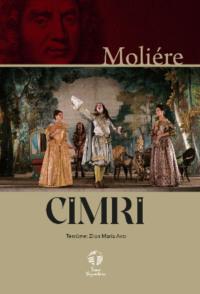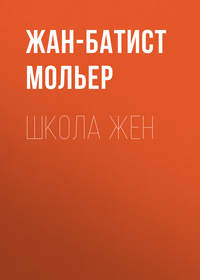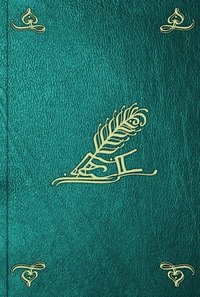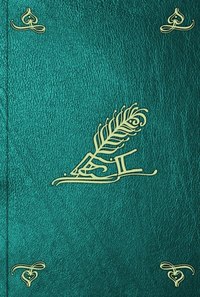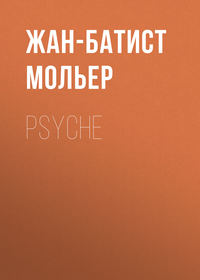 полная версия
полная версияThe Jealousy of le Barbouillé

Molière
The Jealousy of le Barbouillé / (La Jalousie du Barbouillé)
WITH SHORT INTRODUCTIONS AND EXPLANATORY NOTES BY CHARLES HERON WALL
Among the small farces said to have been sketched by Molière during his stay in the provinces, two only which seem genuine have come down to us, and have been published for the last thirty years with his comedies. These are, 'La Jalousie du Barbouillé,' and 'Le Médecin Volant.' Molière has made use of the former in the third act of the comedy called 'George Dandin.'
Molière acted the part of Le Barbouillé.
PERSONS REPRESENTEDLe Barbouillé, husband to Angélique.
The Doctor.
Angélique.
Valère, lover to Angélique.
Cathau, maid to Angélique.
Gorgibus, father to Angélique.
Villebrequin.
La Vallée.
SCENE I. – LE BARBOUILLÉ
Bar. Everybody must acknowledge that I am the most unfortunate of men! I have a wife who plagues me to death; and who, instead of bringing me comfort and doing things as I like them to be done, makes me swear at her twenty times a day. Instead of keeping at home, she likes gadding about, eating good dinners, and passing her time with people of I don't know what description. Ah! poor Barbouillé, how much you are to be pitied! But she must be punished. Suppose you killed her?.. It would do no good, for you would be hung afterwards. If you were to have her sent to prison?.. The minx would find means of coming out. What the deuce are you to do? – But here is the doctor coming out this way; suppose I ask his advice on my difficulties.
SCENE II. – DOCTOR, LE BARBOUILLÉ
Bar. I was going to fetch you, to beg for your opinion on a question of great importance to me.
Doc. You must be very ill-bred, very loutish, and very badly taught, my friend, to speak to me in that fashion, without first taking off your hat, without observing rationem loci, temporis et personæ. What! you begin by an abrupt speech, instead of saying Salve, vel salvus sis, doctor doctorum eruditissime. What do you take me for, eh?
Bar. Really, doctor, I am very sorry; the fact is that I am almost beside myself, and did not think of what I was doing; but I know you are a gallant man.
Doc. Do you know what gallant man comes from?
Bar. It matters little to me whether it comes from Villejuif or Aubervilliers.
Doc. Know that the word gallant man comes from elegant. By taking the g and the a of the last syllable, that makes ga; then by taking the two ll's, adding a and the two last letters nt, that makes gallant; then by adding man you have gallant man. But to come back to what I said; What do you take me for?
Bar. I take you for a doctor. But let us speak a little of what I have to propose to you. You must know that …
Doc. Let me tell you first that I am not only a doctor, but that I am one, two, three, four, five, six, seven, eight, nine, and ten times doctor. Firstly, number one is the base, the foundation, and the first of all numbers; so am I the first of all doctors, the most learned of the learned. Secondly, there are two faculties essential for a perfect knowledge of things: the sense and the understanding; I am all sense, all understanding: ergo, I am twice doctor.
Bar. Agreed. What I want …
Doc. Thirdly, according to Aristotle, the number three is that of perfection; I am perfect; and every thing I do is perfect: ergo, I am three times doctor.
Bar. Very well then, doctor…
Doc. Fourthly, philosophy is divided into four parts, logic, morals, physics, and metaphysics; I possess all four, and know them perfectly: ergo, I am four times doctor.
Bar. Deuce take it, I don't doubt it. Listen to me then.
Doc. Fifthly, there are five universals: the genus, the species, the differentia, the property, and the accident, without knowing which it is impossible to arrive at any satisfactory conclusions; I make great use of them, and know how important they are; ergo, I am five times doctor.
Bar. I must have patience.
Doc. Sixthly, number six is the number of work; I work incessantly for my own glory; ergo, I am six times doctor.
Bar. Well, well, speak as long as you like.
Doc. Seventhly, the number seven is the number of bliss; I possess a perfect knowledge of all that can produce happiness, and by my talents am happy myself. I am therefore forced to say of myself: O ter quaterque beatum! Eighthly, the number eight is the number of justice, on account of the equality which is found in it; the justice and prudence with which I measure and weigh all my actions make me eight times doctor. Ninthly, there are nine Muses, and I am equally the favourite of them all. Tenthly, one cannot pass number ten without repeating all the other numbers, and it is the universal number. Similarly, when people have found me, they have found the universal doctor; and I am in myself all the other doctors together. Thus, with the help of these plausible, true, demonstrative, and convincing reasons, you see that I am one, two, three, four, five, six, seven, eight, nine, ten times doctor.
Bar. What the deuce does he mean by all this? I thought I had found a clever man who would give me good advice, and I find a chimney-sweep, who, instead of speaking to me, plays at mora.1 One, two, three, four – ha! ha! – ha! ha! Come, come, that's not it; you must listen to me, and remember that I am not a man to make you lose your time; I shall make it worth your while, and if you can satisfy me in what I want of you, I will give you what you wish – money, if you like.
Doc. Ha! money?
Bar. Yes, money; and whatever you may ask besides.
Doc. (sharply, tucking up his gown behind him). Then you take me for a man who would do anything for money, for a man fond of money, for a mercenary soul? Know, my friend, that if you were to give me a purse full of gold, and that this purse were in a rich box, this box in a precious case, this case in a superb chest, this chest in a rare museum, this museum in a magnificent apartment, this apartment in a gorgeous castle, this castle in a wonderful citadel, this citadel in a celebrated town, this town in a fertile island, this island in an opulent province, this province in a flourishing monarchy, this monarchy in the whole world;2 that if you gave me the world in which this flourishing monarchy would be, in which this opulent province would be, in which this fertile island would be, in which this celebrated town would be, in which this wonderful citadel would be, in which this gorgeous castle would be, in which this pleasant apartment would be, in which this rare museum would be, in which this wonderful chest would be, in which this precious case would be, in which this rich box would be, in which the purse full of gold would be, I should care no more for it than this (snaps his fingers and exit).
Bar. Well. I made a mistake. Seeing him dressed as a doctor, I felt that of necessity I must speak of money to him; but since he does not want any, nothing can be more easy than to satisfy him. I'll run after him. (Runs out.)
SCENE III. – ANGÉLIQUE, VALÈRE, CATHAU
Ang. I assure you, sir, that you will oblige me very much by coming to see me sometimes: my husband is so ugly, so ill-behaved, and such a drunkard, that it is perfect martyrdom for me to be with him, and I ask you what pleasure one can have with such a clown as he is?
Val. You do me too much honour. I promise you I shall do my utmost to amuse you, and since you are kind enough to say that my company is not unpleasant, my care and attentions shall prove to you what pleasure this good news gives me.
Cat. Ay! quick, talk of something else; here's our old bugbear coming.
SCENE IV. – LE BARBOUILLÉ, VALÈRE, ANGÉLIQUE, CATHAU
Val. Mademoiselle,3 I am very sorry to bring you such bad news, but, you would have heard it from some one else, and since your brother is ill…
Ang. Ah! say no more, sir, I am your servant, and thank you very much for the trouble you have taken.
(Exit Valère.)
Bar. Well! what need is there of my having a certificate of my cuckledom from the notary? So! so! you trollop! I find you with a man in spite of all my remonstrances, and you want to send me from Gemini to Capricornus.
Ang. Are you going to scold me for that? This gentleman only just came to tell me of my brother's serious illness: why should you make that a subject of quarrel?
Cat. Ah, directly I saw him, I wondered if we should be long in peace.
Bar. You spoil one another, you women; you, Cathau, you corrupt my wife; she is not half as good now as she was before she had you to wait upon her.
Cat. Really you treat me in a nice manner.
Ang. Leave the drunkard alone; don't you see that he is so muddled that he does not even know what he says.
SCENE V. – GORGIBUS, VILLEBREQUIN, ANGÉLIQUE, CATHAU, LE BARBOUILLÉ
Gor. Now, there's my cursed son-in-law scolding my daughter again!
Vill. We must see what is the matter.
Gor. What! will you always be quarrelling! Will you never have peace at home?
Bar. This hussy calls me drunkard. (to Angélique) Here, I have a great mind to give you a good dressing4 before your relations.
Gor. May the dev … may his money be blessed, if you have done as he says.5
Ang. It is always he who begins to …
Cat. Cursed be the hour when you chose that sordid wretch!
SCENE VI. – GORGIBUS, VILLEBREQUIN, ANGÉLIQUE, CATHAU, LE BARBOUILLÉ, DOCTOR
Doc. Why, what is the meaning of this? what a disorder! what a quarrel! what a racket! what a row! what a noise! what a dispute! what a combustion! What is the matter, gentlemen? what is the matter? what is the matter? Come, come, is there no way of making you agree, let me be your pacificator; suffer me to bring peace among you.
Gor. It is my son-in-law and my daughter who have had words together.
Doc. But what can it be? Now, come, let me know the cause of their dispute.
Gor. Sir …
Doc. But in a few words …
Gor. Yes, yes; but put on your hat.
Doc. Hat; that is bonnet. Do you know what bonnet comes from?
Gor. No.
Doc. It comes from bonum est, it is good, a thing which is good, because it saves one from colds and coughs.
Gor. Indeed! I did not know that.
Doc. Now quick, the subject of your quarrel?
Gor. This is what happened.
Doc. I hope you are not a man to keep me long when I pray you not to do so. I have some pressing business which calls me to town; still, if I can bring peace to your family, I am willing to stop a moment.
Gor. I shall soon have done.
Doc. Be quick, then.
Gor. It will be said in a moment.
Doc. We must acknowledge, Mr. Gorgibus, that it is a wonderful gift to be able to say things in a few words, and that great talkers, instead of being heard, become often so wearisome that one cannot listen to them; virtutem primam esse puta compescere linguam. Yes, the best quality of an honest man is silence.
Gor. You must know then …
Doc. There are three things which Socrates used to recommend particularly to his disciples: to be careful of one's actions, to be sober in eating, and to say things in a few words. Begin, Mr. Gorgibus.
Gor. It is my wish to do so.
Doc. In a few words, without ceremony, without indulging in a long speech: cut it short with an apophthegm6; quick, quick, Mr. Gorgibus, make haste, avoid prolixity.
Gor. Suffer me to speak then…
Doc. That's enough Mr. Gorgibus, you speak too much. Somebody else must tell me what was the cause of their quarrel.
Vill. You must know, sir, that …
Doc. You are an ignoramus, an unlearned man, ignorant of all good rules; an ass, in plain English. What! you begin a discourse without a word of exordium! Some one else must tell me what happened; will you, young lady, tell me the particulars of all this noise?
Ang. Do you see here my fat rascal, my wine-barrel of a husband …
Doc. Gently, if you please, speak with respect of your husband when you are under the nose of a doctor like me.
Ang. Ah! I should just think so, doctor! I care little for you or your doctrine, and I am a doctor whenever I please.
Doc. You, a doctor when you please. A nice doctor you make. You seem to me to do much as you wish… But, I say, tell me the subject of your uproar.
Bar. Sir, your honour …
Doc. You begin well. "Your honour!" this word has something flattering to the ear, something full of magniloquence; "your honour!"
Bar. According to my will.
Doc. Quite right… "According to my will!" the will speaks of a wish, the wish presupposes means to come to one's ends, and the end presupposes an object. It is well said, "according to my will!"
Bar. I am bursting with rage.
Doc. Cut out this word "bursting." It is a low, vulgar expression.
Bar. But, doctor, listen to me for mercy's sake.
Doc. Audi, quæso, would Cæsar have said.7
Bar. Seize her, or don't seize her, you will listen to me or I will break your doctoral neck! What the devil do you mean by all this?
(Le Barbouillé, Angélique, Gorgibus, Cathau, Villebrequin, wish to explain the cause of the quarrel; the Doctor explains that peace is a fine thing. They all talk together, and make a dreadful noise. In the midst of all this, Le Barbouillé ties the Doctor by the legs with a rope, throws him down on his back, and drags him away; the Doctor goes on talking all the time, and counts all his arguments on his fingers, as if he were not on the ground.)
Gor. Now, my daughter, go back to your home and live in peace with your husband.
Vill. Your servant; good night.
(Exeunt Villebrequin, Gorgibus, and Angélique.)
SCENE VII. – VALÈRE, LA VALLÉE
Val. I am extremely obliged to you, sir, for the trouble you have taken, and I promise you that in about an hour's time I shall be at the place of rendezvous you give me.
La Val. It cannot be put off so long, in a quarter of an hour the ball will be over, and you will miss the pleasure of meeting there the person you love.
Val. Let us go together then.
(Exeunt Valère and La Vallée.)
SCENE VIII. – ANGÉLIQUE (alone)
While my husband is absent, I will just go round to a ball given by one of our neighbours. I shall be back before him, for he is somewhere drinking; he will not even know that I am gone out. The wretched knave always leaves me alone at home, as if I were his dog. (Exit Angélique.)
SCENE IX. – LE BARBOUILLÉ
I knew that I should master that brute of a doctor and his stupid doctrine. Devil take the ignorant ass! I soon brought all his science to the ground. I must now go and see if our good wife has prepared anything for my supper. (Exit.)
SCENE X. – ANGÉLIQUE
How unlucky! I went too late, the party was over. I arrived just as everybody was leaving. But never mind, it shall be for another time. I will go home as if nothing was the matter. Bless me! the door is locked; Cathau! Cathau!
SCENE XI. – LE BARBOUILLÉ (at the window), ANGÉLIQUE
Bar. "Cathau! Cathau!" Well! what is the matter with Cathau? And where do you come from at this time of night, and in such weather?
Ang. Where I come from? Just open the door, and I will tell you.
Bar. Yes, you catch me! You may go and sleep where you come from; I shall not open to a gad-about like you. What! alone at this time of night! I don't know if it is fancy, but my forehead seems to me already rougher by half.
Ang. Well, what do you mean by scolding me because I am alone? You scold me if I have anybody near me; what am I to do?
Bar. Stop at home, give orders for the supper, take care of the household, and of the children; but it is no use talking so much; good-bye, good night, go to the devil and leave me in peace.
Ang. You won't open to me?
Bar. No. I shall not open to you.
Ang. Ah! my dear little husband, I beg of you open the door; do, my darling little heart.
Bar. Ah! crocodile! Ah! dangerous serpent! you caress me to betray me.
Ang. Open, do open.
Bar. Farewell! Vade retro, Satanas!
Ang. What, you won't open.
Bar. No!
Ang. You have no pity for the wife who loves you so much?
Bar. No, I am inflexible. You have offended me, I am revengeful like the very devil! that is to say plainly that I am inexorable.
Ang. Do you know that if you push me too far, and put me in a passion, I may do something which will make you repent your unkindness.
Bar. And what will you do, dear little vixen?
Ang. I declare that if you do not open to me, I will kill myself before the door; my parents will no doubt come here before going to bed, to see if we are all right together, and they will find me dead, and you will be hanged.
Bar. Ha! ha! ha! ha! the silly creature! Tell me who would lose the most? Nonsense, you are not so foolish as to play such a trick.
Ang. You don't believe me. See, here is my knife all ready, if you do not open at once I will pierce myself to the heart with it.
Bar. Take care, it is very sharp.
Ang. You won't open to me?
Bar. I have told you twenty times that I shall not open; kill yourself, die, go to the devil, I care not.
Ang. (pretending to stab herself). Farewell then… Ay! I am dead.
Bar. Can she be stupid enough to do such a thing? I must go down with the light and see.
Ang. (aside). I will pay you back. If I can only slip into the house while you are looking for me, it shall be my turn. (She runs past Barbouillé, and manages to get into the house without his knowledge.)
Bar. Well! I knew she was not so stupid as all that! She is dead, and yet she runs like Pacolet's horse.8 To say the truth, she really frightened me, she did right to run away, for if I had found her alive after she had given me such a fright, my boot would have taught her not to play the fool. I must go to bed now. Hallo! the wind must have shut the door to, I fear. Hi! Cathau, Cathau, open the door.
Ang. (at the window). "Cathau, Cathau! well what is the matter with Cathau?" and where do you come from, you drunkard? Well, well, my parents will soon be here, and will hear all about you. You wine-tap, you infamous wretch, you do not stir from the public-house; but leave a poor wife with little children waiting for you all day at home without caring to know if they want anything.
Bar. Open quickly, she-devil! or I'll break your head open.
SCENE XII. – GORGIBUS, VILLEBREQUIN, ANGÉLIQUE, LE BARBOUILLÉ
Gor. Why, what is it now? still quarrelling and fighting?
Vill. What? will you never agree?
Ang. Only just look at him! he is drunk, and returns at this time of night to make a noise and threaten to kill me.
Gor. She is right: it is not at this hour of night you should come home. Why can you not, like a good father of a family, come home early and live at peace with your wife?
Bar. Deuce take me, if I left the house! Ask those gentlemen who are on the terrace there. It is she who has only just come home. Ah! how innocence is always oppressed!
Gor. Well! Come, come, try to agree together, and ask her to forgive you.
Bar. I ask her to forgive me! I had rather the devil flew off with her. I am in such a terrible rage, I hardly know what to do.
Gor. Come, daughter, kiss your husband, and be friends.
SCENE XIII. – THE DOCTOR (in night-gear at another window)
Doc. What! always noise, disorder, dissension, quarrels, strife, disputes, uproar, everlasting altercations? What is it? What can it be? One can have no rest.
Vill. It is nothing, Mr. Doctor, every one is agreed.
Doc. Ah! about being agreed, shall I read you a chapter of Aristotle, where he proves that all the different parts of the universe subsist only through the concord which exists between them?
Vill. Will it be long?
Doc. No, it's not a bit long, only about sixty or eighty pages.
Vill. Thanks, good night, good night!
Gor. It is not necessary.
Doc. Do you wish for it?
Gor. No.
Doc. Good night, then, since it is so —latine, bona nox.
Vill. Let us all go and have some supper together.
THE END1
An Italian game (Latin, micare digitis), in which one player suddenly raises the hand of which some fingers are shut, and some are open. The other players have to guess the number of fingers raised.
2
In most editions we find "et que tout le monde où serait cette monarchie florissante," which has no meaning. The correct reading is "et que tu me donnerais le monde où serait," &c.
3
See 'Impromptu de Versailles,' Sc. i.
4
Je suis bien tenté de te bâiller une quinte major. Quinte major is a term of piquet. It is here employed figuratively. Compare its use in 'Les Fâcheux,' Act ii. Sc. ii.
5
This seems to be the meaning of "Je dédonne au diable l'escarcelle, si vous l'aviez fait." Je dédonne au diable is apparently a euphemism for Je donne au diable. In French, compare parbleu, corbleu, &c., and deuce, zounds, egad, &c., in English. Dédonne is not given by Littré. It occurs again in 'Le Médecin Volant,' Sc. x., but does not seem to have been employed elsewhere by Molière.
6
Compare Sc. iv. 'Le Mariage Forcé.'
7
Doc. 'Audi, quæso,' aurait dit Cicéron.
Bar. Si ce rompt, si ce brise, &c.
It seems necessary to ascribe the saying to Cæsar, rather than to Cicero, in order to render to some extent this fearful pun.
8
An enchanted dwarf in the old romance of 'Valentine and Orson,' who manufactured a wooden horse, which could go very fast "Courir comme le cheval de Pacolet," remains as a proverb.


